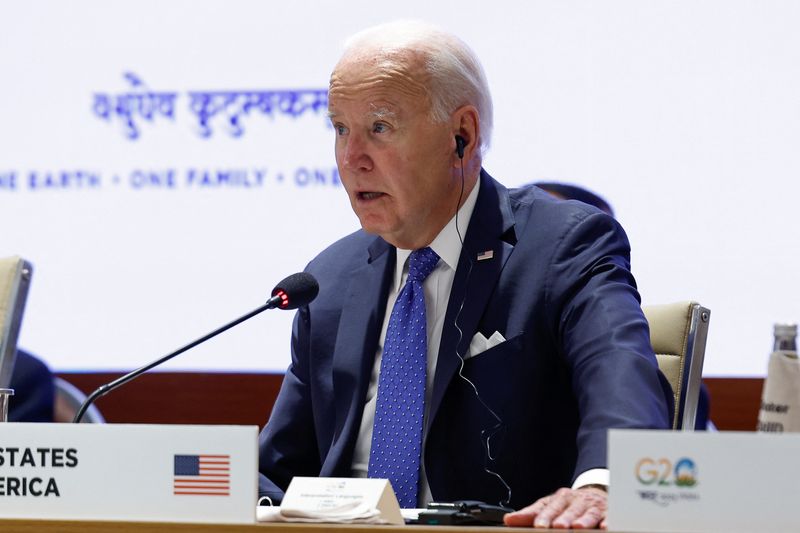By Nandita Bose and Trevor Hunnicutt
HANOI (Reuters) - U.S. President Joe Biden said on Sunday he held his highest level talks with Chinese leadership in months, adding that Beijing's economic wobbles would not lead it to invade Taiwan.
Biden said he met with Chinese President Xi Jinping's No.2, Chinese Premier Li Qiang, at the annual G20 summit in New Delhi. The talks were the highest level meeting between the two powers in nearly 10 months since Biden and Xi spoke at last year's G20 in Indonesia.
Li, who took became premier in March, attended the gathering of world leaders in place of Xi. The two leaders were not expected to hold talks at the G20 but unscripted encounters at summits are common.
"My team, my staff still meets with President Xi's people and his cabinet," Biden told reporters. "I met with his No.2 person in India today."
He added: "We talked about stability," and the Southern Hemisphere. "It wasn't confrontational at all."
The White House on Sunday said Biden had met with a Chinese leader at the summit.
The two super powers have been trying to thaw frosty relations this year after a spat over a suspected Chinese spy balloon that flew over U.S. territory, while fears of an economic slowdown have gripped Beijing.
Speaking at a press conference in Vietnam, Biden touted the U.S. economy as the "strongest" globally. He told reporters that China's growth was slowing due to a weak global economy as well as Chinese policies but did not specify which policies.
Biden called China's economic situation a "crisis," citing issues in the real estate sector and high youth unemployment.
"One of the major economic tenets of his plan isn't working at all right now," Biden said of Xi, without elaborating. "I'm not happy for that, but it's not working."
Biden added: "He has his hands full right now."
The Democratic president is headed into a 2024 re-election campaign where his own handling of the economy and inflation has become a central concern for voters.
The U.S. economy grew at a 2.1% annualised rate last quarter. Central bankers have sharply raised interest rates to bring inflation back down to target levels.
August trade data showed China's exports and imports both narrowing their declines, joining other indicators showing a possible stabilisation in the economic downturn, as policymakers seek to spur demand and fend off deflation.
Li has said China should achieve its 2023 growth target of around 5%, but some analysts think a worsening property slump, weak consumer spending and tumbling credit growth could mean lower growth.
OPEN DIALOGUE
Biden has tried to keep communications open with China to lower the temperature in international frictions including over Taiwan, the self-ruled island claimed by China.
"I don't think this is going to cause China to invade Taiwan," Biden said of the country's economic troubles. "As a matter of fact, the opposite, probably doesn't have the same capacity that it had before."
He described the United States as a Pacific power with no intention of withdrawing from the region.

Biden also said recent moves by Chinese officials to curb the use of U.S.-designed Apple (NASDAQ:AAPL) iPhones by state employees amounted to trying to "change some of the rules of the game" on trade.
"I am sincere about getting the relationship right," he said.